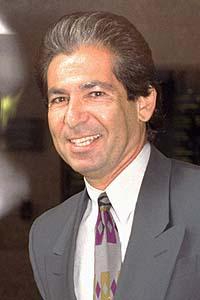

Robert Kardashian of the Simpson murder case
THERE are many sayings about lawyers. Among them:
"The main point, however, is that whatever lawyers say should be taken with a grain of salt because lawyers work for lawyers (themselves) and sometimes they need to also give a sufficiently compelling impression that they work for clients."In the domain of patents, our view of lawyers was largely shaped by what we had read from them. When they don't manage to embed themselves in articles from actual journalists they write nonsense in their own sites (or "blogs"), sometimes even in journals that target other lawyers and give tips, otherwise simply preach to the choir. There is an utter lack of honest, independent journalism about patent law, as we habitually point out.
Unified Patents, not to be mistaken for Unified Patent Court (UPC), has just taken on some trolls by challenging their patents, i.e. the only things that they have. We covered that earlier this year and patent maximalists now say that Unified Patents filed as many as 64 petitions against patents. The piece, from a law firm, is basically shameless self promotion, but in it there are some interesting numbers:
Petitioner Unified Patents, LLC filed an IPR petition challenging 29 claims of US Pat. No. 8,640,183 owned by Convergent Media Solutions, LLC. Unified’s numerous inter partes review (“IPR”) petitions rarely reach a final written decision, but here the Board issued such a decision and invalidated all of the remaining challenged claims. Unified Patents, LLC. v. Convergent Media Solutions, LLC, IPR2016-00047, Paper 23 (P.T.A.B. March 29, 2017).
[...]
To date, Unified has filed 64 IPR petitions, many of which are still pending or settled before a final decision. Unified typically challenges software and electrical patents, which have an aggregate institution rate of 71% (1931/2724). Unified’s institution rate is much lower at 49% (19/39). Even more notable is the fact that only 8.5% (4/47) of Unified’s completed, no longer pending, IPRs have reached a final written decision. This is much lower than the aggregate rate of 34% (1474/4345) for all patent IPRs.
"Unified Patents, not to be mistaken for Unified Patent Court (UPC), has just taken on some trolls by challenging their patents, i.e. the only things that they have."Another law firm, Pearl Cohen Zedek Latzer Baratz LLP, has just published this piece that promotes the perception software patents have become more potent. Caleb Pollack and Kyle Auteri from this firm use their cherry-picking skills to paint a misleading picture. As one who has been following it closely, this is nonsensical cherry-picking of very old CAFC cases (as old as a year ago and most recent half a year ago). Here is the core argument:
While this is only one panel of three judges out of over 115 judges participating in ex-parte appeals at the PTAB, and it is unclear if the PTAB is more inclined towards finding claims are patent eligible than examiners, it is clear that the chances of overcoming software related rejections have improved since the Federal Circuit decisions in Enfish, Bascom, and McRO, decided in May 12, 2016, June 27, 2016, and September 13, 2016, respectively.
"Some of the worst (meritless) patent cases go to East Texas and still, in spite of the low quality of patents, the judges rule for the plaintiff, even when the plaintiff makes nothing at all."Last but not least, here is a new article about the likely fate of East Texas as 'litigation central' or 'rocket docket'. Earlier this week and last week we wrote a great deal about it, but here is more:
On paper, Kraft v. TC Heartland is not a very exciting case. It’s a lawsuit involving artificial sweeteners and the plastic containers they come in. It’s not the kind of case one would expect to make it all the way to the US Supreme Court and have sweeping implications for the future of the US technology industry. But let’s back up.
Kraft makes a product called MiO, a liquid artificial sweetener it calls a “Liquid Water Enhancer.” TC Heartland, a limited-liability company based in Indiana, makes a similar product: the “Refreshe Fruit Punch Drink Enhancer.” Kraft sued TC Heartland in 2014, saying it infringed upon three patents related to the containers the products come in.
[...]
Clearly, the idea here is that patent trolls have some sort of advantage in East Texas. But what is it? Do juries in this court tend to lean toward the plaintiffs? That was a question Justice Anthony Kennedy put to Kraft’s lawyer, William Jay, during the arguments last Monday. He asked whether “generous jury verdicts enter into this, or is that something we shouldn’t think about?”